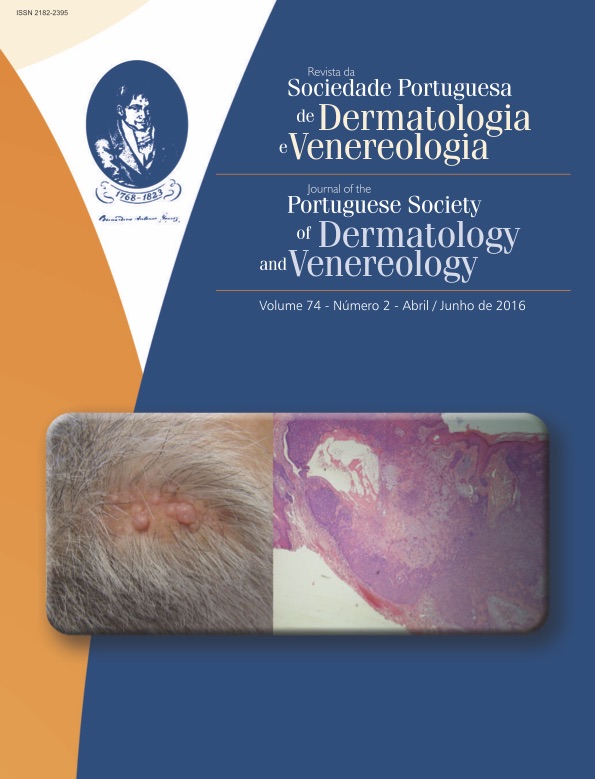Cutaneous and Other Reactions to the Processionary Caterpillar (Thaumetopoea Pityocampa)
Abstract
Pine caterpillar, Thaumetopoea pityocampa, is a phyto-lepidopteran, responsible for the delay in the growth or the death of various types of pine trees. Besides nature damage, pine caterpillar causes dermatological reactions in humans by contact with the irritating hairs of the larvae. Although dermatitis occurs among outdoor professionals, it is primarily non-professional. Means of contamination comprise direct contact with the nest or the processional caterpillar and indirect contact with air dispersed hairs. Dermatitis is generally observed in late spring and particularly from March to June, among campers and tourers. The eruption has its onset 1-12 hours after contact with the hairs and presents with intense and continuous itching. Apart from the skin, T. pityocampa can involve the eyes and rarely the airways. Despite the considerable damages to humans and nature, pine caterpillar infestation is an underestimated problem; medical literature lists few studies and, often, relevant information is referred to local media and popular wisdom.
Downloads
References
Mallet J. The Lepidoptera Taxome Project Draft Proposals and Information, 2007. [accessed March 2015] Available
at: http://www.ucl.ac.uk/taxome/lepnos.html.
Hossler EW. Caterpillars and moths. Part II. Dermatologic manifestations of encounters with Lepidoptera. J Am Acad
Dermatol. 2010; 62:13-28.
Hossler EW. Caterpillars and moths. Dermatol Ther. 2009; 22:353-66.
R.A.F. De Reaumur, Mémoire pour servir à l’histoire des insects. Paris: Imprimerie Royale; 1736.
J. H. Fabre, Un virus des insectes, Masson, 1898.
Hódar JA, Castro J, Zamora R. Pine processionary caterpillar Thaumetopoea pityocampa as a new threat for relict
Mediterranean Scots pine forests under climatic warming. Biol Conserv.2003; 110:123-9.
Solt I, Mendel Z. The pine processionary caterpillar Thaumetopoea pityocampa. Harefuah.2002; 141: 810-57.
Battisti A, Stastny M, Netherer S, Robinet C, Schopf A, Roques A, at al. Expansion of geographic range in the pine
processionary moth caused by increased winter temperatures. Ecological Applications. 2005; 15:2084-96.
Fagrell B, Jorneskog G, Salomonnson AC, Larsson S, Holm C. Skin reactions induced by experimental exposure
to setae from larvae of the northern pine processionary moth (Thaumetopoea pinivora). Contact Dermatitis.2008;
:290-5.
Battisti A, Holm G, Fagrell B, Larsson S. Urticating hairs in arthropods: their nature and medical significance. Annu
Rev Entomol.2011; 56:203-20.
Vega JM, Moneo I, Armentia A, Fernández A, Vega J, de la Fuente R, et al. Allergy to the pine processionary caterpillar (Thaumetopoea pityocampa). Clin Exp Allergy. 1999; 29:1418-23.
Vega JM, Moneo I, Garcia Ortiz JC, Sánchez Palla P, Sanchís ME, Vega J, et al. Prevalence of cutaneous reactions to pine processionary moth (Thaumetopoea pityocampa) in an adult population. Contact Dermatitis.2011;64:220-8.
Vega JM, Moneo I, Armentia A. Anaphylaxis to a pine caterpillar. Allergy. 1997; 52:1244-5.
Vega JM, Moneo I, Armentia A, Vega J, de la Fuente R, Fernández A. Pine processionary caterpillar as a new
cause of immunologic contact urticaria. Contact Dermatitis. 2000; 43:129-32.
Vega ML, Vega J, Vega JM, Moneo I, Sanchéz E, Miranda A. Cutaneous reactions to pine processionary caterpillar
(Thaumetopoea pityocampa) in pediatric population. Pediatr Allergy Immunol.2003; 14:1-5.
Lamy M, Pastureaud MH, Novak F, Ducombs G, Vincendeau P, Maleville J, et al. Thaumetopoein: an urticating
protein from the hairs and integument of the pine processionary caterpillar (Thaumetopoea pitycampa Schiff., Lepidoptera, Thaumetopoeidae). Toxicon.1986; 24:347-56.
Rodriguez-Mahillo AI, Gonzalez-Muñoz M, Vega JM, López JA, Yart A, Kerdelhué C, et al. Setae from the pine
processionary moth (Thaumetopoea pityocampa) contain several relevant allergens. Contact Dermatitis. 2012;
:367-74.
Vega JM, Vega J, Vega ML, Moneo I, Armentia A, Sánchez B. Skin reactions to pine processionary caterpillar. Allergy.
; 58:87-8.
Inal A, Altintaş DU, Güvenmez HK, Yilmaz M, Kendirli SG. Life-threatening facial edema due to pine caterpillar mimicking an allergic event. Allergol Immunopathol. 2006;34:171-3.
Bonamonte D, Foti C, Vestita M, Angelini G. Skin reactions to pine processionary caterpillar Thaumetopoea
pityocampa schiff. ScientificWorldJournal. 2013; 2013:867431.
All articles in this journal are Open Access under the Creative Commons Attribution-NonCommercial 4.0 International License (CC BY-NC 4.0).








